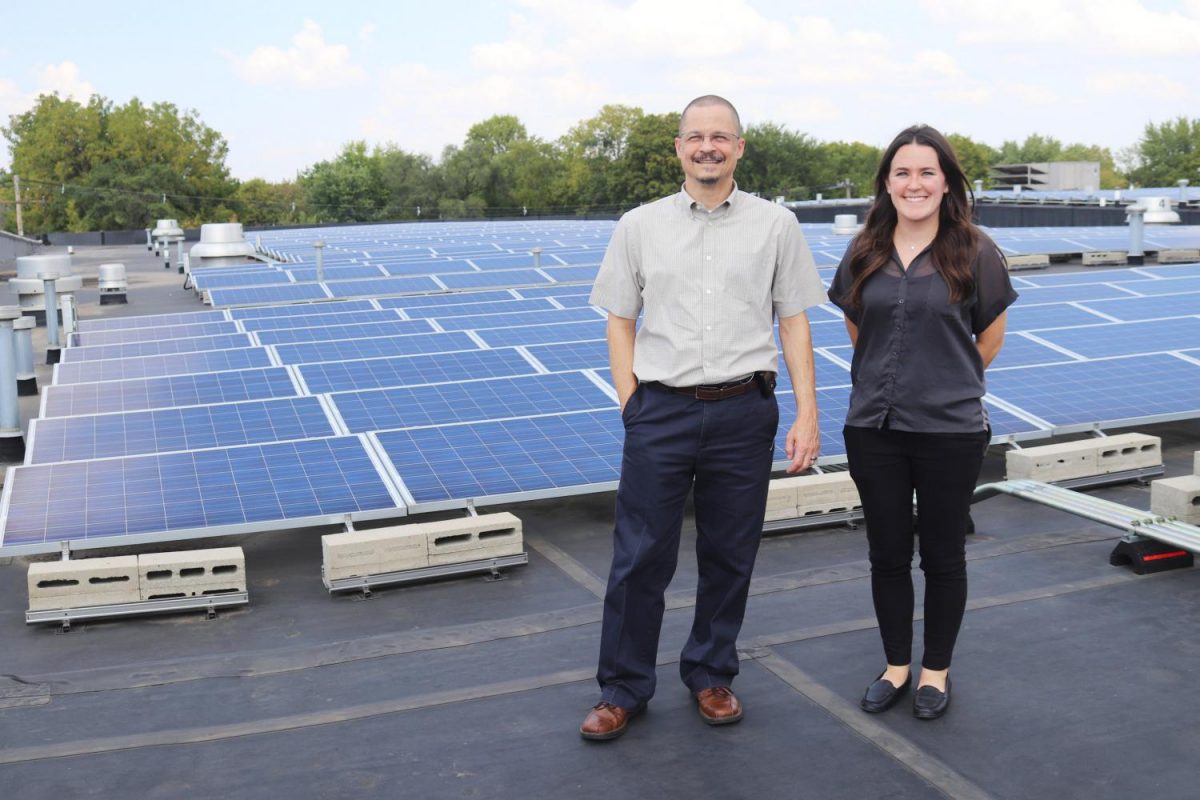CUMTD goes green
Managing Director, Karl Gnadt, and Grants Manager, Jane Sullivan, stand in front of their new solar panels that will help run the new CUMTD Hydrogen Fuel Cell Buses. The buses are set to be replaced some time in 2019.
Sep 25, 2017
Last updated on Sept. 26, 2017 at 05:21 p.m.
After partnering with the Center for Transportation and the Environment (CTE), the Champaign-Urbana Mass Transit District (CUMTD) was awarded $1.45 million by the Federal Transit Administration to update city buses.
The new buses will replace two of the standard diesel-powered buses that are 16 years old. The recommendation is to keep buses for up to twelve years, so those have exceeded their useful life, said Jane Sullivan, grants manager, CUMTD.
The grant will help pay for the more expensive hydrogen fuel cell buses, and CUMTD wants to produce their own hydrogen on site, said Karl Gnadt, managing director of CUMTD.
In addition to buying buses, CUMTD will build the infrastructure that allows them to produce hydrogen with the grant money.
Get The Daily Illini in your inbox!
A standard diesel bus costs approximately, $300,000 whereas a hybrid costs about $30,000 more, according to ThoughtCo.
Hydrogen fuel cell buses are more expensive than a standard diesel or hybrid bus, and CUMTD is purchasing 60-foot buses, which is an “up-charge,” said Gnadt.
In order to execute the plan, they will use electrolysis. Then, they will release the oxygen and store the hydrogen in a tank. The hydrogen is then injected into the the fuel cell on the bus.
Chemically, they will reintroduce oxygen to create water. The process will release energy that will power the electric motor that runs the bus.
The buses will run by a chemical process, as opposed to a burning process, and will have zero emissions. As opposed to releasing carbon into the environment, the hydrogen fuel cell buses will only emit drinkable water, said Sullivan.
The buses will be “quietly driven vehicle(s)” because “there’s no engine … just an electric motor,” said Gnadt.
As of now, CUMTD uses solar panels as an energy source. They plan on expanding their solar array in an effort to lower the costs of production for the hydrogen fuel cell buses.
Gnadt said, CUMTD’s focus is, “not just what is released into the environment, but we’re also not depleting natural resources.”
CTE is a non-profit organization that assisted CUMTD in research and finding funding for the hydrogen fuel cell buses, said Jane Sullivan, grants manager of CUMTD. CUMTD’s effort to reduce Champaign-Urbana’s carbon footprint has been long-standing.
Their move toward hydrogen fuel is the next step in a virtually decade-long promise to purchasing buses less dependent on diesel fuel.
“A pile of carbon released by one diesel-fueled bus, in a day, would be equivalent to the size of a 2,000-square-foot house,” Assistant Professor of Mechanical Engineering, Kyle Smith said.
The hydrogen fuel cell buses are expected to hit the road in 2019.






